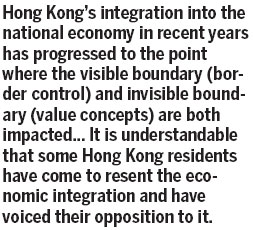Apple Daily exaggerates HK's problems
Updated: 2012-11-10 06:17
By Chow Ba-Chun(HK Edition)
|
|||||||||
Apple Daily ran an editorial the other day with the headline "Two major crises define Hong Kong's current situation". It claims Hong Kong is currently dominated by two major crises. One is that the SAR government is on the brink of losing public confidence completely; and the other is that the notion of "de-mainlandization" is growing among local residents and clashing with rising intensity against the cross-boundary integration drive keenly pursued by the central government and the SAR government.
According to this logic, the only way to resolve these crises is to end the current chief executive's leadership and the process of Hong Kong-mainland integration.
First, it must be noted that, although Hong Kong's political situation is very complicated right now, what the SAR government needs to do is to sum up its experience so far and bring its governance to a new level. Some residents still have fond memory of the British colonial rule, but it is unlikely they can turn Hong Kong society against the trend of becoming part of the nation's advancement. Clearly the Apple Daily editorial has overhyped the overall situation.
Second, it is necessary to find out what exactly the editorial means by "two major crises".

In the four months or so since it was sworn in, the new SAR government has indeed faced some bumps as a few of its principal officials found their integrity had been thrown into doubt. While those officials' personal crises exposed their weaknesses, the phenomenon also reflects the fact that political conflicts are becoming fiercer in Hong Kong and people holding key administrative posts are hard-pressed to live up to exceptionally high expectations from the press as well as politicians.
The greatest challenge facing the new SAR government is to demonstrate its ability to govern and administrate as best it can, particularly in addressing such difficult issues as economic transformation, political evolution and social progress. Compared with the damaging effect of some principal officials' personal crises on the SAR government's administrative strength, the ability to make and execute policies is much more crucial. It has nothing to do with the popularity of individual officials, but everything to do with the political wisdom and administrative prowess of the top governing team.
Both political wisdom and administrative prowess are vital to the success of a government. The new SAR government must find out exactly what is amiss and why in the past four months and make whatever improvements necessary to avoid repeating past mistakes and do a better job. There is no question the SAR government has much to learn and prove, but it is not anywhere near the "brink of completely losing public confidence" as the Apple Daily editorial claims.
Hong Kong's integration into the national economy in recent years has progressed to the point where the visible boundary (border control) and invisible boundary (value concepts) are both impacted. The implementation of policies and measures designed to enhance cross-boundary exchanges has been problematic at one point or another. It is understandable that some Hong Kong residents have come to resent the economic integration and have voiced their opposition to it.
The opposition parties and their allies in the press naturally appreciate the political worth of such negative sentiment and are capitalizing on it as much as they can to turn more people against their mainland compatriots as well as the central government.
Efforts should made to improve the process of economic integration and help Hong Kong residents understand this integration will continue, whether they like it or not, and no one can stop or turn it around. After all, it's in the fundamental interests of Hong Kong people.
The author is a current affairs commentator.
(HK Edition 11/10/2012 page3)